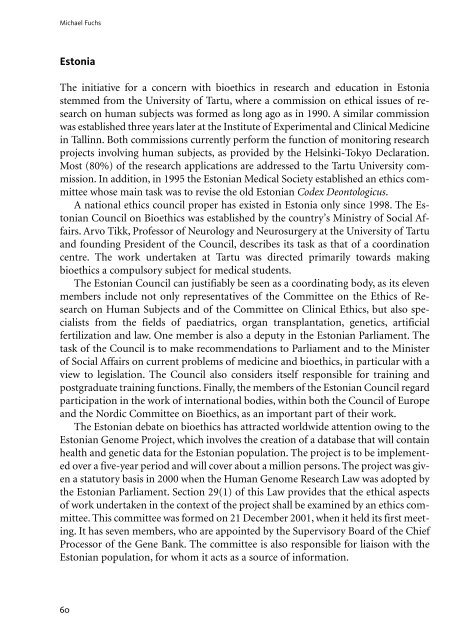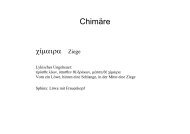Michael Fuchs National ethics councils - Deutscher Ethikrat
Michael Fuchs National ethics councils - Deutscher Ethikrat
Michael Fuchs National ethics councils - Deutscher Ethikrat
Create successful ePaper yourself
Turn your PDF publications into a flip-book with our unique Google optimized e-Paper software.
<strong>Michael</strong> <strong>Fuchs</strong> <strong>National</strong> <strong>ethics</strong> <strong>councils</strong>. Their backgrounds, functions and modes of operation compared<br />
Estonia<br />
The initiative for a concern with bio<strong>ethics</strong> in research and education in Estonia<br />
stemmed from the University of Tartu, where a commission on ethical issues of research<br />
on human subjects was formed as long ago as in 1990. A similar commission<br />
was established three years later at the Institute of Experimental and Clinical Medicine<br />
in Tallinn. Both commissions currently perform the function of monitoring research<br />
projects involving human subjects, as provided by the Helsinki-Tokyo Declaration.<br />
Most (80%) of the research applications are addressed to the Tartu University commission.<br />
In addition, in 1995 the Estonian Medical Society established an <strong>ethics</strong> committee<br />
whose main task was to revise the old Estonian Codex Deontologicus.<br />
A national <strong>ethics</strong> council proper has existed in Estonia only since 1998. The Estonian<br />
Council on Bio<strong>ethics</strong> was established by the country’s Ministry of Social Affairs.<br />
Arvo Tikk, Professor of Neurology and Neurosurgery at the University of Tartu<br />
and founding President of the Council, describes its task as that of a coordination<br />
centre. The work undertaken at Tartu was directed primarily towards making<br />
bio<strong>ethics</strong> a compulsory subject for medical students.<br />
The Estonian Council can justifiably be seen as a coordinating body, as its eleven<br />
members include not only representatives of the Committee on the Ethics of Research<br />
on Human Subjects and of the Committee on Clinical Ethics, but also specialists<br />
from the fields of paediatrics, organ transplantation, genetics, artificial<br />
fertilization and law. One member is also a deputy in the Estonian Parliament. The<br />
task of the Council is to make recommendations to Parliament and to the Minister<br />
of Social Affairs on current problems of medicine and bio<strong>ethics</strong>, in particular with a<br />
view to legislation. The Council also considers itself responsible for training and<br />
postgraduate training functions. Finally, the members of the Estonian Council regard<br />
participation in the work of international bodies, within both the Council of Europe<br />
and the Nordic Committee on Bio<strong>ethics</strong>, as an important part of their work.<br />
The Estonian debate on bio<strong>ethics</strong> has attracted worldwide attention owing to the<br />
Estonian Genome Project, which involves the creation of a database that will contain<br />
health and genetic data for the Estonian population. The project is to be implemented<br />
over a five-year period and will cover about a million persons. The project was given<br />
a statutory basis in 2000 when the Human Genome Research Law was adopted by<br />
the Estonian Parliament. Section 29(1) of this Law provides that the ethical aspects<br />
of work undertaken in the context of the project shall be examined by an <strong>ethics</strong> committee.<br />
This committee was formed on 21 December 2001, when it held its first meeting.<br />
It has seven members, who are appointed by the Supervisory Board of the Chief<br />
Processor of the Gene Bank. The committee is also responsible for liaison with the<br />
Estonian population, for whom it acts as a source of information.<br />
60<br />
Website<br />
Estonian Council on Bio<strong>ethics</strong> (Ethics Committee for the Genome Project): http://www.geenivaramu.ee<br />
Bibliography<br />
Storm, L. (2001). Die wichtigste Entscheidung ist in Estland schon gefallen. Frankfurter Allgemeine Zeitung vom<br />
30. April 2001 (Politik): 5.<br />
Tikk, A.; Parve, V. (2000). Ethic Committees in Estonia. In: Glasa, J.; Council of Europe (ed.). Ethics Committees<br />
in Central & Eastern Europe. Bratislava: 173 – 178.<br />
Lithuania<br />
Lithuania has had a national bio<strong>ethics</strong> committee (Lietuvos bioetikos komitetas,<br />
LBEK) since 1995. It was established by a decree of the Minister of Health of 27 December<br />
1995 after the Law on the Lithuanian Health System took effect. All its members<br />
are also appointed by the Minister of Health. There are 17 members, equally<br />
divided between medical and non-medical specialists (the latter being legal experts,<br />
ethicists, philosophers, psychologists, theologians, etc.). Members are appointed on<br />
the basis of experience and expertise in the field of biomedical <strong>ethics</strong>. The chair was<br />
elected by majority vote at the constituent meeting. He is Eugenijus Gefenas, who is<br />
also a member of the CDBI and of the IBC (UNESCO). Since 1997 he has been Professor<br />
of Biomedical Ethics at the University of Vilnius. The institution and competence<br />
of the Lithuanian Bio<strong>ethics</strong> Committee are governed by the Law of 11 May<br />
2000 on the Ethics of Biomedical Research. The Lithuanian Committee has the status<br />
of a legal entity whose activities are funded from the state budget.<br />
The Committee’s specific tasks, under Article 13(2) of the founding decree, are to<br />
analyse bioethical problems and to advise central and local authorities and organizations<br />
on these matters, to submit proposals and conclusions in relation to laws and<br />
other legal instruments for the regulation of bioethical problems, to prepare Opinions<br />
and ethical reports on biomedical research and to monitor the work of regional<br />
biomedical research <strong>ethics</strong> committees. Once a year it is required to submit a report<br />
of activities to the Minister of Health and to make proposals on how biomedical<br />
problems should be addressed. The Committee must assess the extent to which<br />
individual and public healthcare conforms to the requirements of medical <strong>ethics</strong> and<br />
monitor legal entities’ observance of bioethical principles. Other tasks are the provision<br />
of methodological support and advice to medical <strong>ethics</strong> committees in healthcare<br />
institutions, as well as representing Lithuania in international organizations<br />
concerned with issues falling within the Committee’s field of competence.<br />
The enumeration of these tasks illustrates the intense concentration of responsibilities<br />
for bioethical debate and advice in Lithuania. For the practical operation of<br />
61




